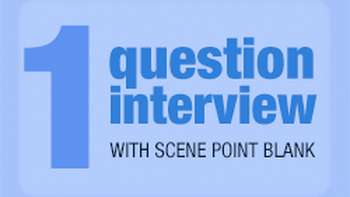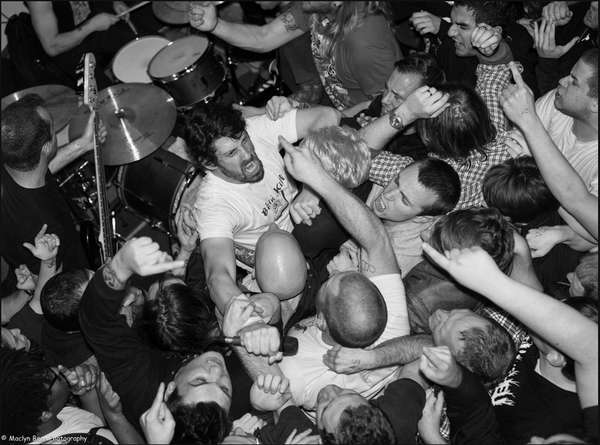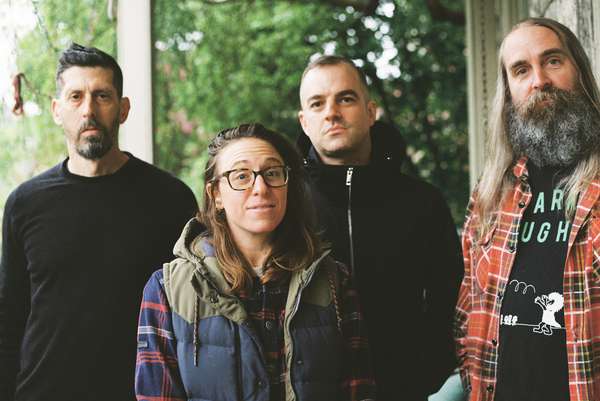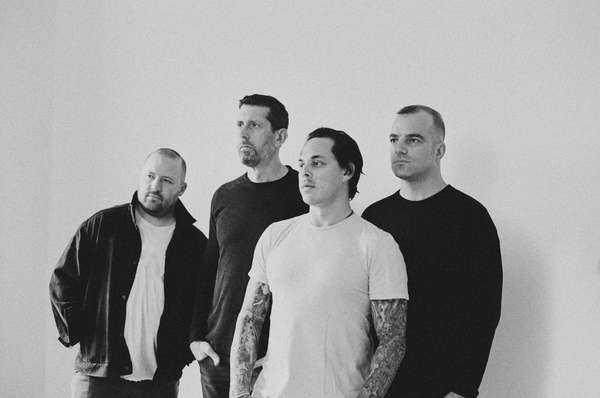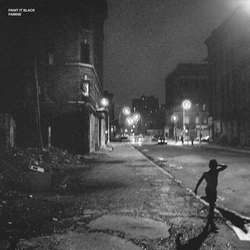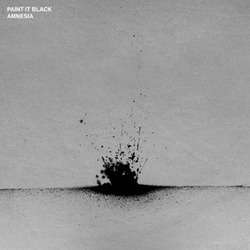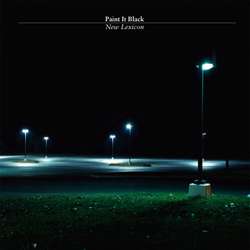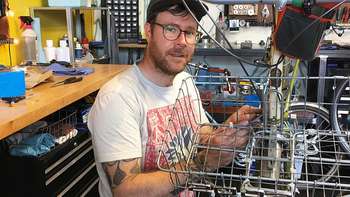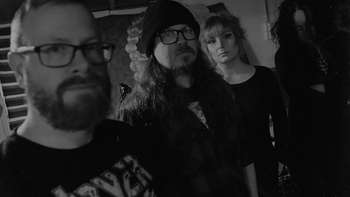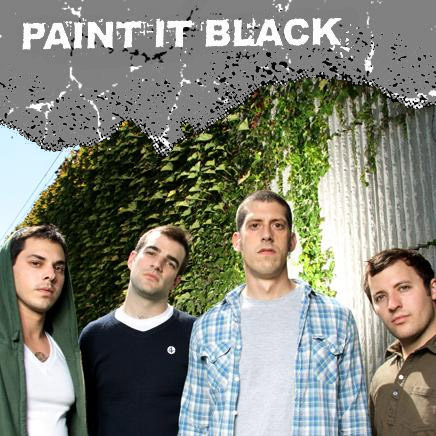
Being an outlet for frustration, aggression, and a variety of other angst-type emotions, it's common for many hardcore bands to exist for only small increments of time. Being in a hardcore band can be a very cathartic, yet taxing experience, making a fuse that's easily snuffed. Paint it Black, running on six years and three albums, are always abundant with ideas and energy without showing an inkling of remission or tire. Dan Yemin spoke with Scene Point Blank about the politics behind New Lexicon and how it gives nods hardcore punk's past while paving a road to its future.
Scene Point Blank: Two sold out release shows: how were they? How was the response to the new songs? I remember seeing Paint it Black right before you released Paradise and half the set consisted of new songs. Did you play a bulk of the songs from New Lexicon?
Dan Yemin: The shows were amazing! Some of the most inspirational crowd response I've ever seen, and of course the lineups were flawless. I felt like we actually got to curate a mini-punk/hardcore festival of our own! We played four new songs in a seventeen-song set. No one wants to hear a set dominated by songs they don't know. But the reaction to the new stuff was been really great. The second day we opened with "Past Tense, Future Perfect" which we had posted on the web a few weeks before. Kids went nuts!
Scene Point Blank: The songs on each new album get progressively longer since CVA; in terms of tempo you certainly haven't stopped but you have slowed down somewhat. Any reason for that?
Dan Yemin: I'm not sure I agree that we've slowed down, although I could see your point. We have more songs that are mid-tempo, but the fast songs are a lot faster then they were in the past. In terms of having more songs that don't just rely on blazing fast beats, we're just trying to expand the dynamic range a little bit.
Scene Point Blank: This album also shows an increasing amount of melody? Do you get shit for it? People saying either, "It's not punk" or, "It's not punk enough." Think about Tragedy or any good crust band; their songs have an immense amount of melody although it's presented differently than what people commonly associate the word "melody" with.
Dan Yemin: I don't really care about people's complaints or critiques. Melody is, and always has been, an important element in punk music. When the song calls for melody, we incorporate melody. When it calls for bulldozer brutality, then that's what you get. We just follow our instincts.
Scene Point Blank: Another question about sound: Are you going to try to reproduce any of the post production sounds in a live setting?
Dan Yemin: Not really. I see the stage and the studio as totally different mediums. These songs were heavy and intense before the post-production was added, and they'll still have the necessary impact without it.
Scene Point Blank: I know there was an emphasis to get a really thick, heavy sound, akin to a lot of the stuff released in the 80's (most people cite the bass on early Bad Brains records), but some of that had to do with the amps and recording equipment of the time. What specific things did you do to get the sound out of your instruments for these songs? How did J. Robbins help you achieve that?
Dan Yemin: We use pretty vintage gear, which is part of it. Basically a Marshall 800 and an Ampeg SVT, with some modern Mesa Boogie mixed in. Although, ironically, the bass on the early Bad Brains stuff was supposedly recorded with a Peavey bass amp turned up to ten, and Peavey has a reputation for being the Hyundai of amplifiers. Working with them and J. is great because he's from the 80's punk scene and has an intimate understanding of the sounds we're going for. He also has the right microphones and knows where to place them, which is the real talent
Scene Point Blank: I remember reading in an earlier interview that you wanted to do all the writing for the band so if members dropped out the overall sound wouldn't change? You and Andy are the only original members, have you given him, or the other members, more leeway in the band's sound or direction since its inception?
Dan Yemin: I gave Jared, Josh, and Andy a lot of room to re-arrange, re-interpret, and contribute to the songs this time around. New Lexicon is finally a Paint it Black album in which all four of us have equal ownership and equal stake. It was an amazing experience to learn to trust them and to let go of the control. I think it only could have happened with this specific lineup, because it was clear that they were as committed to it as I was.
Scene Point Blank: A new lexicon: why do we need a one? How is language failing us, or what does our current syntax imply that is causing problems? Or am I reading this too literally?
Dan Yemin: It's both literal and allegorical I guess. I think one of the basic things that human beings need in order to survive is intimate, genuine connection with other people. But language is only a symbolic estimate of subjective experience, and even the people closest to us so often misunderstand us. It's frustrating to try to connect, or to explain what we're thinking or feeling, only to be misunderstood. Music is sort of a universal tool for building bridges between people I think. Also, on a less literal level, the mainstream music business has appropriated, or stolen, the most superficial aspects of punk (fashion, stagediving, etc) in order to market "alternative" music to people. When our language has been appropriated for more sinister purposes, like marketing, we need to find a new set of symbols in order to communicate. Like if you're at war, and the enemy breaks your code, you need to develop a new code!
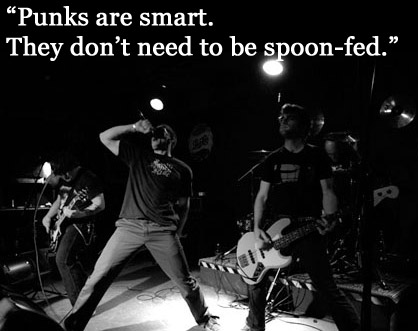
Scene Point Blank: I'm captured by the lyric "Live fast, but don't die young. Slow down, but don't ever stop." I mean no disrespect, but you're fairly older than I am, so your points of reference are greater than mine. Has this desire for fast-track success amplified over the years?
Dan Yemin: I have no desire for fast-track success, but I think that mainstream culture in the U.S. emphasizes the fantasy of success at all costs. When faced with the question, "What do you want to do with your life?" I hear so many kids say, "I don't know, I just want to have a lot of money." This is really sad to me. So many people work sixty to eighty hours a week, fifty weeks a year, in order to fill the holes in their lives with material possessions, and it never actually keeps people from feeling empty. The conservative government here has done a pretty thorough job of convincing even poor people that they are middle class, and the trappings of middle class life are readily available if you're willing to go into debt on credit cards, so that even the people who are being screwed by the government will vote for them anyway, mistakenly identifying with their oppressors, thinking that they¹re interests are being represented, when in fact they're being fucked. And not "fucked" in a good way.
Scene Point Blank: There are a lot outspoken references to monotheism and its pitfalls. Any reason for it?
Dan Yemin: I would think that would be obvious. Organized religion can be a strong source of community for people, and community is a beautiful thing, but organized religion is too often a tool for social control, and political leverage. Religious orthodoxy is dangerous, and upholds a long tradition of sexism and homophobia. To hell with it. Literally.
Scene Point Blank: The song "Past Tense, Future Perfect" coalesces ideas that were separate entities on previous albums (love, religion, autonomy) to show that all themes fit together in our lives, with each affecting the others. Do you think people are unaware of how cohesive their lives are? Why might we refuse to believe this cohesion?
Dan Yemin: I think that maybe in order to make life feel less complex and overwhelming, humans naturally compartmentalize aspects of our experience, putting things into different categories, creating the illusion of "either/or" instead of trying to see the ways in which the parts of our lives are interconnected. For example, I think "hope" & "despair," "love" & "hate," and "autonomy" & "dependence" are all intimately connected, even though on the surfaced they appear to be opposites. I try to put that across in our songs.
Scene Point Blank: "We Will Not" has a sort of underdog mentality suggesting that a lot of people are seen as scrappers and calling them vermin says their M.O. is survival. Do you think this is true? If so what might be some of the reason we squander abandon our dreams and ambitions? "White Kids Dying of Hunger" points at this too, a society of people young and old, confining themselves to the narrow world of their day to day lives. Realistically what are our chances of changing this behavior? Do we all need a personal Paint it Black to light a fire up under our asses?
Dan Yemin: The "vermin" in that song refers to all of us in the punk/hardcore community, including myself. It's a call to arms to resist a culture of materialism, and to spend our time and energy on labors of love. I was inspired by Aesop Rock's "Labor Days." Fighting complacency is always an uphill struggle, but as we say in the song "Goliath" (from the limited edition 7" that we gave away at the record release show): "The uphill fight's the pilot light that keeps the flame on!"
Scene Point Blank: To get at this higher level of being and awareness, would it call for evolution or revolution? Let's use the issue of oil as a concrete example, to make an impact do we need simply stop drilling altogether or slowly approach the situation and deal with the issue as resources deplete further?
Dan Yemin: I think that a meaningful life is a series of tiny revolutions. I'm neither an economist nor a student of political science, so I wouldn't pretend to have the wisdom to propose a solution to a problem as complex as our dependence on fossil fuels. Good luck with that, though. Let me know if you figure it out! I think it might be hopeless, at least until we bomb ourselves back to the Stone Age!
Scene Point Blank: There was a time when you had a brief explanation of song meanings on your site. Ever think of doing that again for the less astute listeners?
Dan Yemin: At this point I'm leaning more towards letting the words stand on their own, and giving people the opportunity to find their own meanings in the songs, or to interpret them in a variety of ways. Of course, people are welcome to email or Myspace us and discuss the lyrics. Especially with some of the deeply personal stuff, I would hate to dilute the meaning that other people can find for themselves, and by shoving my literal experience down their throats, I¹m afraid I would get in the way of people forming their own unique relationship with the songs. Punks are smart. They don't need to be spoon-fed.
Scene Point Blank: Not sure where I read it but you said the band is seriously considering only releasing seven inches from now on, something that Fucked Up did in the beginning of their career and continues to do. What are advantages and disadvantages of this? I love Fucked Up but I can't help but thinking it's type of marketing scheme, releasing three or four singles at five bucks a piece as opposed to a CD/LP at a slightly lower price. Then there are labels that release records like trading cards (do people even still collect those?), where in order to have a complete set you have to buy three of four different colors, some in limited quantities which fetch big dollars on eBay.
Dan Yemin: Not to be a jerk, but considering most people steal digital music rather than pay for it, I can't really sympathize with people complaining about the price of records. Vinyl is a precious commodity and costs a lot to produce. As a record collector, I think that it¹s more than worth the cost. It's not like we charge anyone for the thousands of hours it takes to write, arrange, and produce the music. We release limited color pressings because to us that's part of the fun of doing vinyl, and if people really feel the need to be obsessive and collect all the different colors, who am I to judge? But you can't really hold us responsible for the fact that some people have a record fetish. In terms of the pros and cons? The positive is that I really believe that the 7" is the ultimate format for hardcore. The negative is that if you don't have a turntable you¹re shit out of luck. Moral of the story? You should really own a turntable!
Scene Point Blank: You said, "It's not like we charge thousands of hours to write, arrange, and produce the music". Do you think the bend toward Mp3's and strictly digital releases will lean people into seeing music more of an experience than a commodity with a tangible product in the way to you pay to see a movie or exhibit at a museum? Bouncing Souls are thinking of releasing their next album only as a digital format, Ben Weasel started a label that will only do digital releases, and Wes Eisold brought up a similar point that you made, how people sometimes see music as a disposable art form, not realizing the hours put into the songs that may be ninety seconds long.
Dan Yemin: I'm not sure people always understand how much work goes into that ninety second song, between writing, arranging, rehearsing, and recording. I understand getting too angry about "the evils of free downloading" is a waste of time, and in a way like spitting into the wind, in that it's sort of futile. There's a simple reality that this is how most people get their music, and we probably can't do much to change that at this point. On the other hand, I do feel that a lack of a tangible, tactile thing attached to the music serves to devalue it in a way, and that's one of the reasons I love vinyl so much. I can touch it, and in a sense that embodies its value. It's complicated though, because in other ways, music is like emotion, which is by definition intangible.
Words: Scottie
Graphics: Matt
Intro Photo: Chrissy Piper
- Official Paint it Black Site: http://www.paintitblack.org/

